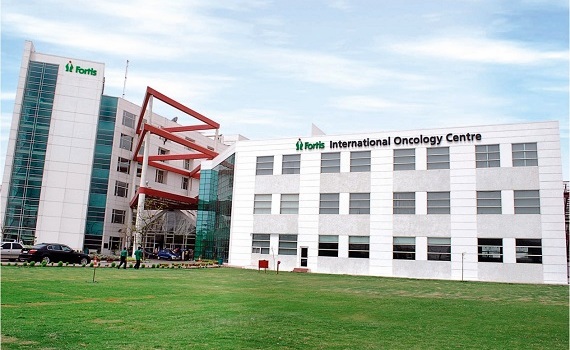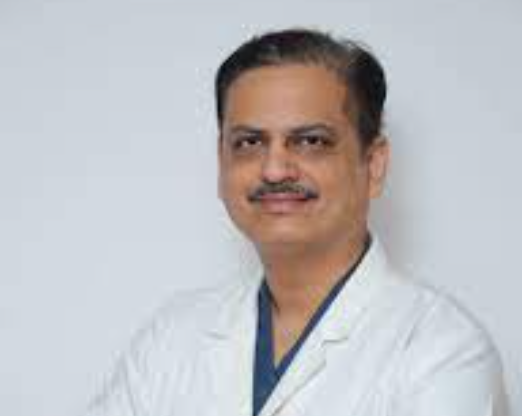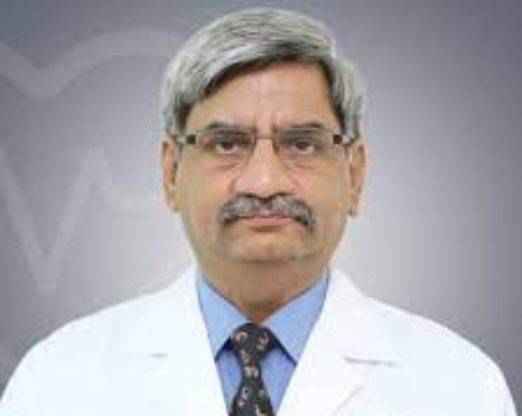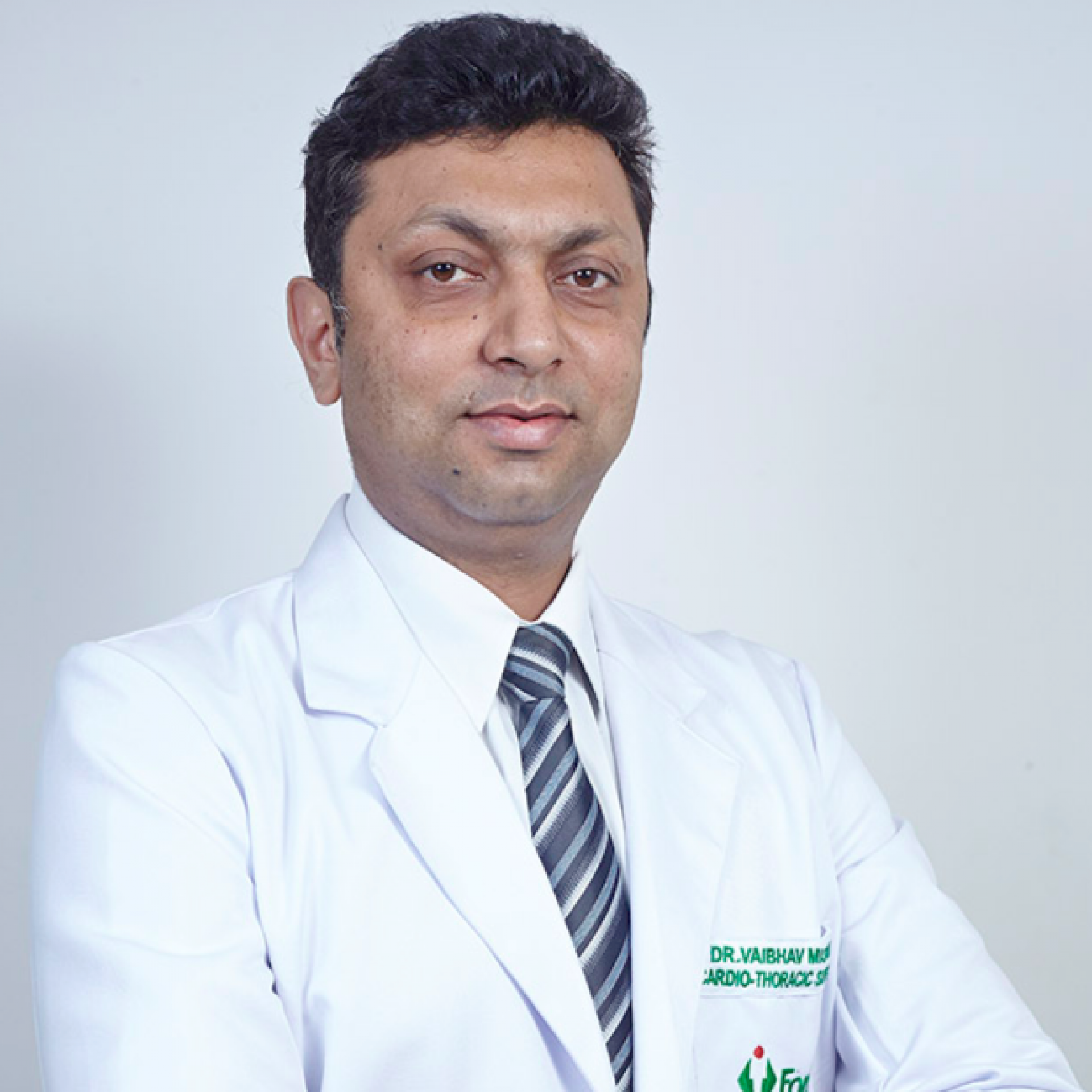Fortis Hospital, Noida
B-22, Rasoolpur Nawada, D Block, Sector 62, Noida, Uttar Pradesh 201301, India
Fortis Hospital, Noida is a premier state-of-the-art facility with over 236 beds including 12 operation theatres.The hospital is positioned as a Centre of Excellence in oncology, orthopedics, neuroscience, liver transplant, kidney transplant, and with a... read more
Send EnquiryAbout The Hospital
Fortis Hospital, Noida is a premier state-of-the-art facility with over 236 beds including 12 operation theatres.
The hospital is positioned as a Centre of Excellence in oncology, orthopedics, neuroscience, liver transplant, kidney transplant, and with a key focus on cardiac sciences and emergency trauma care services.
The hospital is well known for having one of the most advanced Neurosciences and Orthopaedics departments as well as Kidney and Liver Transplant Programmes in Noida with over 1,500 successful transplants to its credit.
The second mega hub hospital, in the Fortis Healthcare group, it caters to the special needs of patients and their families.
The hospital has been designed and developed to deliver patient care with maximum ease, warmth and effectiveness.
It began operations in 2004, the hospital has become the prime tertiary healthcare Centre in the city. It addresses a wide range of healthcare needs and prides itself in performing many first procedures in India and U.P.
The hospital is known for its high standards in excellence and cardiology and cardiac surgery amongst others. A professional and highly experienced team of cardiologists, duly supported by the latest medical technology makes it possible to offer patients the best possible medical attention.
It offers comprehensive and superior cardiac care to the patients. Commitment toward the patient welfare and to providing quality healthcare is reflected in the unique design attributes of the hospital.
The NABH accredited hospital has an allocation space that exceeds the current Indian norm of 800-900 sq./bed. This allows for better flexibility to adapt and accommodate future requirements of patient care. Hospital's approach is based on patient centricity, state-of-the-art emergency response, integrity, teamwork, ownership and innovation, combines compassionate patient care with clinical excellence, to achieve a single-minded objective-- Saving and Enriching lives.
Treatments Offered
Top Doctors
Director & Head- Neuro & Spine Surgery
CONSULTS AT EXPEREIENCE :19+ years SURGERIES :
10000+
Treatment Price on request
Free Text ConsultTreatment Price on request
19+ years SURGERIES :
10000+ TREATMENT COST
Treatment Price on request
Treatment Starting at $2,500
Free Text ConsultTreatment Starting at $2,500
15 years SURGERIES :
12000+ TREATMENT COST
Starting at $2,500
Senior Consultant - Medical Oncology | Surgical Oncology
CONSULTS AT EXPEREIENCE :24 years SURGERIES :
10000+
Treatment Price on request
Free Text ConsultTreatment Price on request
24 years SURGERIES :
10000+ TREATMENT COST
Treatment Price on request
Director - Liver Transplant & Hpb Surgery
CONSULTS ATFortis Memorial Research Institute, Gurgaon +2
EXPEREIENCE :20+ years SURGERIES :
4000+
Treatment Price on request
Free Text ConsultTreatment Price on request
20+ years SURGERIES :
4000+ TREATMENT COST
Treatment Price on request
Director - Blood Disorders And Bone Marrow Transplant
CONSULTS ATFortis Memorial Research Institute, Gurgaon +1
EXPEREIENCE :15 years SURGERIES :
800+
Treatment Price on request
Free Text ConsultTreatment Price on request
15 years SURGERIES :
800+ TREATMENT COST
Treatment Price on request
Additional Director & Head - Cardiothoracic And Vascular Surgery
CONSULTS AT EXPEREIENCE :12 years SURGERIES :
NA
Treatment Starting at $2,800
Free Text ConsultTreatment Starting at $2,800
12 years SURGERIES :
NA TREATMENT COST
Starting at $2,800
Patient Testimonials

Maryam Begum
Age - 64 Years
Watch the story of Maryam Begum from Bangladesh, who wanted to go for ... Read More

Muhammad Nuhu
Age - 18 Years
The patient is a young boy who was diagnosed with AVM since birth acco... Read More

Nazmun Naher
Age -
Patient Nazmun Naher had come to get treatment for her spine issue and... Read More
Nearby Guest House
Team & specialisation
The hospital is the only corporate facility in Uttar Pradesh that covers an entire array of specialties from diagnostics to organ transplant (kidney & liver).
The Cardiac Centre for Excellence at Fortis Hospital, Noida has carved a name for itself in the medical fraternity.
The hospital has also emerged as one of the leading referral Centre for renal science across the country. It is equipped with a spacious state-of-the-art dialysis unit that minimizes the risk of infection to ensure a safer dialysis process for our patients.
Infrastructure

Number Of Beds
236. ICU-92

Operation Theatres
12

No Of Surgeon
56
Fortis Hospital Noida excels in technology and infrastructure, offering advanced healthcare services. With a best-in-class Cath Lab, state-of-the-art Operation Theatres, and advanced Radiology & Pathology services, the hospital ensures precise diagnostics and treatments.
It also features a 24*7 Emergency Department, dedicated Cardiac ICU, and in-house Lab & Blood bank for comprehensive care and efficient services. Fortis Hospital Noida's commitment to cutting-edge technology and infrastructure creates a reliable and high-quality healthcare environment.
Blogs
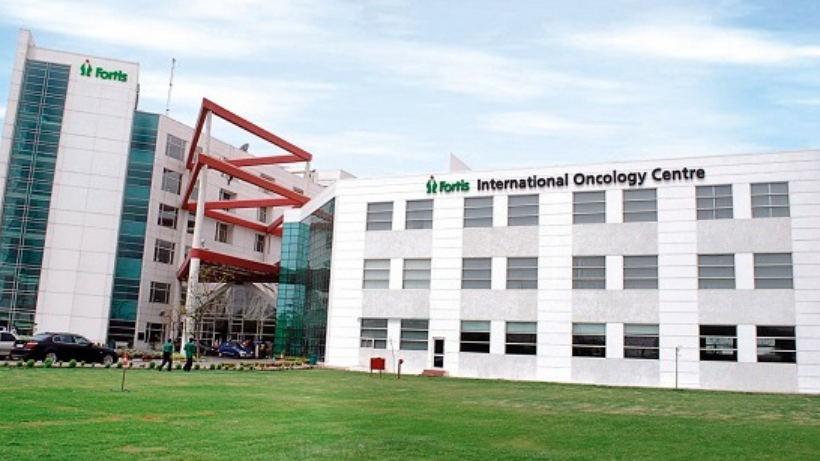
Liver Transplant at Fortis Hospital, Noida: A Comprehensive Guide
IntroductionFortis Hospital, Noida, established in 2004, stands as a premier healthcare facility with a focus on delivering state-of-the-art medical services. Among its various centers of excellence, the Liver Transplant Program is a testament to its commitment to providing advanced and comprehensive healthcare solutions.Recognizing Liver Disease: Key Symptoms1. FatigueOne of the primary indicators of liver disease is persistent fatigue. Patients may experience extreme tiredness, weakness, and a general lack of energy, even after adequate rest.2. JaundiceJaundice, characterized by yellowing of the skin and eyes, is a prominent symptom of liver dysfunction. It occurs when the liver is unable to process bilirubin, leading to its accumulation in the bloodstream.3. Abdominal PainDiscomfort or pain in the abdominal region is a common sign of liver issues. This pain may be localized or diffuse and is often accompanied by a feeling of fullness or bloating.4. Weight LossUnintentional weight loss can be attributed to liver diseases affecting nutrient absorption and metabolism. Individuals experiencing significant weight loss without changes in diet or exercise should seek medical attention.5. Changes in Stool ColorLiver diseases can alter the color and consistency of stool. Pale, clay-colored, or tar-like stools may indicate issues with bile production or flow.6. Swelling and Fluid RetentionLiver diseases may lead to fluid retention, causing swelling in the legs, ankles, or abdomen. This condition, known as edema, results from the liver's reduced ability to regulate fluid levels.7. Itchy SkinPruritus, or persistent itching, can be associated with liver disorders. The accumulation of bile salts in the bloodstream may cause itching, affecting the skin all over the body.8. Dark UrineDark-colored urine, especially if it appears darker than usual, may indicate liver problems. The discoloration is often linked to the liver's inability to eliminate bilirubin properly.9. Nausea and VomitingLiver disease can lead to digestive issues, including nausea and vomiting. These symptoms may be particularly noticeable after meals and can contribute to a lack of appetite.Diagnosing Liver Conditions: 1. Advanced Diagnostic ToolsAt Fortis Hospital, Noida, the diagnosis of liver conditions involves a multifaceted approach, utilizing advanced diagnostic tools to ensure precision and accuracy.2. Imaging StudiesState-of-the-art imaging studies, such as ultrasound, CT scans, and MRI, play a crucial role in assessing the structure and function of the liver. These non-invasive techniques provide detailed images to identify abnormalities.3. Blood TestsA series of blood tests are conducted to evaluate liver function. Markers such as ALT, AST, ALP, and bilirubin levels are assessed to gauge the health of the liver and identify potential issues.4. BiopsyIn some cases, a liver biopsy may be recommended. This procedure involves taking a small tissue sample from the liver for microscopic examination. It helps in confirming the diagnosis and determining the extent of liver damage.5. Fibro ScanFortis Hospital, Noida, employs innovative technologies like Fibro Scan, a non-invasive method to assess liver fibrosis. This technique measures liver stiffness, providing valuable information about the liver's condition without the need for a traditional biopsy.6. EndoscopyEndoscopic procedures, such as an endoscopic retrograde cholangiopancreatography (ERCP), may be utilized to visualize the bile ducts and identify any blockages or abnormalities.7. Genetic TestingFor certain liver conditions with a genetic component, genetic testing may be recommended to assess the risk and provide personalized treatment plans.8. Collaborative ConsultationsA multidisciplinary team of hepatologists, gastroenterologists, radiologists, and pathologists collaborates to analyze the results comprehensively. This collaborative approach ensures a thorough understanding of the patient's condition and tailors the treatment plan accordingly.9. Timely Intervention is KeyThe combination of these diagnostic tools allows for early detection of liver diseases, enabling timely and targeted interventions. Fortis Hospital, Noida, prioritizes a swift and accurate diagnosis to initiate the most effective treatment strategies for each patient.Liver Transplant Procedure: A Step-by-Step Guide1. Patient Evaluation and SelectionBefore the liver transplant procedure, a thorough evaluation of the patient's medical history, current health status, and compatibility for the transplant is conducted. This involves assessing the severity of liver disease, overall health, and the absence of contraindications.2. Listing for TransplantIf deemed suitable for a liver transplant, the patient is added to the national organ transplant waiting list. The allocation of donor livers is based on factors such as blood type, body size, and medical urgency.3. Pre-transplant PreparationIn the weeks leading up to the transplant, the patient undergoes a series of pre-transplant preparations, including blood tests, imaging studies, and consultations. These assessments ensure the patient is in optimal condition for the upcoming surgery.4. Donor Matching and Organ RetrievalSimultaneously, efforts are made to match the patient with a suitable donor. Once a compatible liver becomes available, the organ retrieval process begins. The donor liver is carefully procured while maintaining its viability for transplantation.5. Recipient Surgery PreparationThe recipient is prepared for surgery, which involves administering anesthesia and positioning the patient for the transplant procedure. Monitoring devices are placed to track vital signs throughout the surgery.6. Implantation of the Donor LiverThe transplant surgeon makes an incision in the recipient's abdomen, providing access to the diseased liver. The donor liver is then meticulously implanted, and blood vessels and bile ducts are connected to ensure proper blood flow and function.7. Monitoring and Post-operative CarePost-transplant, the patient is closely monitored in the intensive care unit (ICU) for a period to manage any immediate postoperative complications. Continuous monitoring includes assessing liver function, blood clotting, and overall recovery progress.8. Recovery and RehabilitationAs the patient stabilizes, they are transferred to a regular hospital room for further recovery. Physical therapy, medications, and counseling may be incorporated into the rehabilitation plan to facilitate a smooth recovery process.9. Follow-up CareAfter discharge, regular follow-up appointments are scheduled to monitor the long-term success of the transplant. Medication adherence, lifestyle modifications, and ongoing medical assessments are integral components of post-transplant care.10. Emotional and Psychological SupportRecognizing the emotional impact of a liver transplant, Fortis Hospital, Noida, offers comprehensive support services. These may include counseling, support groups, and resources to help patients and their families cope with the emotional aspects of the transplant journey.Treatment Plan at Fortis Hospital, Noida,I. InclusionsThe liver transplant package at Fortis Hospital, Noida, typically includes:Pre-transplant evaluationsSurgical procedurePost-operative careMedications and follow-up consultationsII. ExclusionsWhile specific inclusions may vary, common exclusions are:Non-medical expensesSpecialized tests beyond the standard protocolExpenses related to unforeseen complications.III. DurationThe duration of a liver transplant procedure and subsequent recovery varies based on individual cases. The medical team at Fortis Hospital, Noida, tailors the treatment plan to each patient's unique needs.IV. Cost BenefitsWhile the cost of liver transplant may seem daunting, Fortis Hospital, Noida, offers competitive and transparent pricing. The hospital's commitment to affordable healthcare ensures that patients receive top-notch treatment without compromising their financial well-being.Visit: Fortis Hospital, Noida Noida. Best hospital in Noida, book online appointment, get free advice. (healthtrip.com)Understanding the Costs of Liver Transplant at Fortis Hospital, NoidaEstimated Cost BreakdownAt Fortis Hospital, Noida, the cost of a liver transplant can vary based on several factors, including the patient's condition and the type of transplant. While these figures are approximations, they provide a general overview:1. Donor Evaluation: ?1-2 LakhsThe initial stage involves comprehensive donor evaluation to ensure compatibility and health. Costs associated with thorough assessments are estimated to be between ?1-2 lakhs.2. Hospital Stay: ?5-10 LakhsThe duration of the hospital stay significantly impacts the overall cost. This estimate includes room charges, nursing care, and other related expenses, ranging from ?5-10 lakhs.3. Surgery: ?10-15 LakhsThe surgical procedure itself incurs substantial costs, covering the expertise of the medical team, use of operation theaters, and associated resources. The estimated cost for the surgery is between ?10-15 lakhs.4. Medications: ?2-5 LakhsPost-transplant, patients require medications to prevent rejection and manage other aspects of recovery. The estimated cost for these medications ranges from ?2-5 lakhs.Additional ConsiderationsIn addition to the core expenses outlined above, it's crucial to factor in additional costs that may arise:- Travel and AccommodationPatients traveling from out of town must account for travel and accommodation expenses for themselves and their caregivers. These costs can vary based on the distance traveled and the duration of the stay.- Lost WagesRecovery from a liver transplant may require time away from work. Patients should anticipate potential lost wages during the recovery period, adding to the overall financial considerations.- Out-of-Pocket ExpensesBeyond the primary medical costs, individuals may encounter out-of-pocket expenses, such as prescription medications and copayments. These should be considered in the overall budget for the transplant.The Fortis Advantage: Why Choose Fortis Hospital, Noida?1. World-Class ExpertiseFortis Hospital, Noida, stands as a beacon of medical excellence with a team of highly skilled and experienced specialists. The liver transplant program, led by Dr. Vivek Vij, Director of Liver Transplant & Hpb Surgery, reflects a commitment to unparalleled expertise in complex transplant procedures.2. Cutting-Edge TechnologyEquipped with state-of-the-art medical technology, Fortis Hospital, Noida, ensures that liver transplant procedures are at the forefront of innovation. Advanced imaging, robotic-assisted surgery, and innovative diagnostic tools contribute to precision and successful outcomes.3. Comprehensive Care ApproachFortis Hospital, Noida, goes beyond the surgical procedure, adopting a holistic approach to patient care. From pre-transplant evaluations to post-operative monitoring, the hospital prioritizes emotional and psychological well-being, ensuring a comprehensive and supportive experience for patients and their families.4. Multidisciplinary CollaborationThe liver transplant program at Fortis Hospital, Noida, is characterized by seamless collaboration among various medical specialists. Hepatologists, gastroenterologists, radiologists, and pathologists work together to assess each patient thoroughly and create personalized treatment plans.5. Innovative Diagnostic TechniquesFortis Hospital, Noida, stands at the forefront of medical innovation, utilizing cutting-edge diagnostic tools. Technologies like FibroScan offer a non-invasive method to assess liver fibrosis, ensuring a more accurate evaluation without the need for traditional invasive procedures.6. Transparent and Competitive PricingFortis Hospital, Noida, is dedicated to providing affordable healthcare. The hospital offers transparent and competitive pricing for liver transplant procedures, ensuring that patients receive world-class treatment without compromising their financial well-being.7. Accreditation and Quality StandardsAccredited by the National Accreditation Board for Hospitals & Healthcare Providers (NABH), Fortis Hospital, Noida, upholds high standards of quality and safety in patient care. This accreditation underscores the hospital's commitment to excellence in healthcare delivery.8. Proven Track RecordWith a legacy dating back to 2004, Fortis Hospital, Noida, has consistently established itself as a leader in healthcare. The liver transplant program, with numerous successful procedures, reflects the hospital's unwavering commitment to achieving positive outcomes for patients.Patient Testimonials: 1. Mr. Sharma - Liver Transplant Recipient"Choosing Fortis Hospital, Noida, for my liver transplant was the best decision I made. The expertise of the medical team and the compassionate care I received made my journey to recovery smoother than I could have imagined. The support extended beyond the operating room, with a focus on my overall well-being. I am grateful for the new lease on life that Fortis has provided."2. Mrs. Kapoor - Family Member"The support and information provided by the hospital's staff during my husband's liver transplant were exceptional. Fortis Hospital, Noida, truly prioritizes the well-being of both patients and their families. The collaborative approach of the medical team and the emphasis on comprehensive care eased the challenges of the entire process. Fortis has not just treated my husband's liver; they've treated our entire family with care and respect."3. Mr. Gupta - Post-Transplant Reflections"I am writing this note to express my gratitude to the team at Fortis Hospital, Noida. From the initial evaluations to the post-transplant care, every step was handled with utmost professionalism. The transparent communication, the empathetic approach of the staff, and the use of advanced technology made a significant difference in my experience. Fortis not only gave me a new liver but also a renewed sense of hope and health."4. Mrs. Singh - A Journey of Resilience"Facing the need for a liver transplant was daunting, but Fortis Hospital, Noida, turned it into a journey of resilience and recovery. The personalized care, the attention to detail, and the constant support from the medical team made a challenging time more manageable. I want to thank everyone at Fortis for their dedication to healing and their commitment to patient well-being."5. Mr. Patel - Grateful for Expertise"My gratitude to the liver transplant team at Fortis Hospital, Noida, knows no bounds. The expertise and precision exhibited during the surgery were commendable. The post-operative care was equally exceptional, with a focus on monitoring and ensuring a smooth recovery. Choosing Fortis for my liver transplant was a life-changing decision, and I am thankful for the skilled hands and compassionate hearts that guided me through the process.ConclusionFortis Hospital, Noida, emerges as a beacon of excellence in liver transplantation. The hospital's unwavering commitment to patient well-being, combined with a multidisciplinary approach and cutting-edge technology, makes it a preferred choice for individuals seeking liver transplant services. Choosing Fortis Hospital, Noida, is not just a medical decision; it's a step towards a healthier and more vibrant life.

Navigating Liver Cancer and its treatment in India
Liver cancer, a malignancy originating in liver cells, poses a significant global health concern. With diverse types, including hepatocellular carcinoma (HCC) and intrahepatic cholangiocarcinoma (ICC), timely diagnosis is crucial. India, a key player in liver cancer treatment, offers advanced medical infrastructure, renowned healthcare professionals, and cutting-edge technologies. This guide explores India's role, highlighting the importance of early detection and providing insights into diverse treatment modalities and healthcare facilities for liver cancer.Types of Liver Cancer1. Hepatocellular Carcinoma (HCC): Hepatocellular carcinoma is the most prevalent form of liver cancer, originating in the hepatocytes, the primary functional cells of the liver. Risk factors for HCC include chronic hepatitis B or C infection, cirrhosis, excessive alcohol consumption, and certain genetic disorders. Given its frequency, understanding the distinct characteristics and progression patterns of HCC is crucial for effective diagnosis and treatment.2. Intrahepatic Cholangiocarcinoma (ICC): Intrahepatic cholangiocarcinoma arises from the bile ducts within the liver. This type presents unique challenges due to its location and can be associated with conditions such as primary sclerosing cholangitis. ICC requires careful differentiation from HCC for accurate diagnosis and tailored treatment approaches.3. Other Rare Types: Liver cancer encompasses various rare types, such as fibrolamellar carcinoma and angiosarcoma. Though infrequent, these variants demand specialized attention due to their distinctive characteristics. Understanding the nuances of these rare types is crucial for comprehensive diagnostic assessments.Causes and Risk FactorsLiver cancer is a complex disease influenced by various factors:Chronic Viral Infections: Chronic infections with hepatitis B or C significantly elevate the risk of developing liver cancer. Routine screening for viral hepatitis is vital for early detection and intervention.Cirrhosis: Cirrhosis, often resulting from prolonged liver damage, is a major precursor to liver cancer. Chronic alcohol abuse, non-alcoholic fatty liver disease (NAFLD), and certain genetic disorders can lead to cirrhosis.Environmental Toxins: Exposure to aflatoxins, a type of mold-produced toxin found in contaminated food, and other environmental toxins can contribute to the development of liver cancer.Metabolic Diseases: Conditions like hemochromatosis and alpha-1 antitrypsin deficiency increase susceptibility to liver cancer.Non-Alcoholic Fatty Liver Disease (NAFLD): The rising prevalence of NAFLD, often associated with obesity and metabolic syndrome, has become an additional risk factor for liver cancer.Symptoms and Signs of Liver CancerEarly stages of liver cancer may be asymptomatic, emphasizing the importance of routine screening for at-risk individuals. However, as the disease progresses, symptoms may include:Unexplained Weight Loss: Sudden and unexplained weight loss can be indicative of advanced liver cancer.Abdominal Pain and Swelling: Discomfort or pain in the upper abdomen, accompanied by swelling, may signal liver involvement.Jaundice: Yellowing of the skin and eyes (jaundice) is a common manifestation of liver dysfunction.Fatigue and Weakness: Generalized fatigue and weakness may be present due to the body's response to the cancer.Stages of Liver CancerStaging is crucial in determining the extent of liver cancer and guiding treatment decisions:Stage 0 (Zero): The cancer is confined to a small area and has not spread beyond the liver.Stages I-III: Cancer has progressed, involving larger portions of the liver and potentially nearby structures.Stage IV: Advanced cancer that may have spread to distant organs, making treatment more challenging.Understanding the specific stage of liver cancer aids healthcare professionals in tailoring treatment plans to the individual needs of the patient.Diagnosing Liver Cancer in IndiaA. Screening and Early DetectionIn India, as in many parts of the world, the emphasis on screening and early detection has become pivotal in the battle against liver cancer. Given the often asymptomatic nature of the disease in its early stages, targeted screening programs have been initiated to identify individuals at high risk. Common high-risk groups include those with chronic hepatitis B or C infections, individuals with cirrhosis, and those with a family history of liver cancer.Early detection not only facilitates timely intervention but also significantly improves the chances of successful treatment. Various health campaigns and awareness programs in India encourage at-risk individuals to undergo regular screenings, fostering a proactive approach to liver health.B. Diagnostic Procedures1. Imaging Tests (CT Scans, MRI, Ultrasound):State-of-the-art imaging technologies play a pivotal role in the diagnosis of liver cancer in India. Computed Tomography (CT) scans, Magnetic Resonance Imaging (MRI), and ultrasound are employed to visualize the liver and identify any abnormalities. These non-invasive techniques help determine the size, location, and characteristics of potential tumors. Indian healthcare facilities, equipped with advanced imaging technology, ensure precise and accurate diagnostic imaging.2. Biopsy:When imaging suggests the presence of liver abnormalities, a biopsy may be recommended to confirm the diagnosis. A liver biopsy involves the extraction of a small tissue sample for microscopic examination. In India, specialized liver biopsy procedures are conducted by experienced hepatologists, ensuring accuracy in identifying cancerous cells and guiding subsequent treatment decisions.3. Blood Tests:Blood tests, including alpha-fetoprotein (AFP) levels and liver function tests, are integral components of the diagnostic process. Elevated AFP levels can indicate the presence of liver cancer, prompting further investigation. Additionally, liver function tests provide valuable insights into the overall health of the liver. In India, these blood tests are routinely conducted, contributing to the comprehensive evaluation of liver health.C. Importance of Accurate Diagnosis for Effective Treatment PlanningAccurate diagnosis is the linchpin for formulating effective and tailored treatment plans for liver cancer patients in India. The diverse nature of liver cancer, including different types and varying stages, necessitates precision in identification. A precise diagnosis enables oncologists, surgeons, and other specialists to determine the most appropriate treatment modalities, whether surgical interventions, locoregional therapies, or systemic treatments.In the context of India's evolving role in liver cancer treatment, accurate diagnosis becomes the cornerstone for navigating the complexities of the disease. The collaborative efforts of healthcare professionals in India, combined with cutting-edge diagnostic tools, ensure that each patient receives a thorough and precise diagnosis, setting the stage for a comprehensive and effective treatment journey.Treatment Options of Liver CancerA. Surgery:1. Hepatectomy: Hepatectomy is a surgical procedure aimed at removing a portion of the liver affected by cancer. The extent of liver tissue removal depends on the size and location of the tumor. It is crucial for preserving sufficient liver function post-surgery. Hepatectomy is considered for patients with localized tumors and sufficient liver function for the remaining organ to compensate. Advances in surgical techniques, such as laparoscopic or robotic-assisted hepatectomy, contribute to reduced recovery times and improved outcomes.2. Liver Transplant: Liver transplantation involves replacing the entire liver with a healthy one from a deceased or living donor. This option is reserved for specific cases, typically when the tumor is limited to the liver and the patient meets strict criteria. Successful liver transplants offer a chance for a cure, but the scarcity of donor organs and stringent eligibility requirements limit its applicability. Immunosuppressive medications are necessary post-transplant to prevent rejection.3. Expertise of Renowned Surgeons in Indian Hospitals: Indian hospitals have gained recognition for their skilled surgeons specializing in liver cancer treatment. These experts often utilize the latest surgical techniques, including minimally invasive approaches, and collaborate with international counterparts to ensure the highest standards of care.B. Locoregional Therapies:1. Radiofrequency Ablation (RFA): RFA involves the insertion of a specialized probe into the tumor, emitting radiofrequency waves that generate heat and destroy cancer cells. It is particularly effective for small liver tumors and is considered less invasive than surgery. RFA is associated with a shorter hospital stay, quicker recovery, and a lower risk of complications compared to traditional surgical interventions.2. Transarterial Chemoembolization (TACE): TACE is a combination therapy that involves injecting chemotherapy drugs directly into the blood vessels supplying the tumor. This is often combined with the embolization of these vessels, reducing blood flow to the tumor. TACE is employed when surgery or systemic therapy is not suitable, providing a localized treatment option.C. Systemic Therapies:1. Chemotherapy: Chemotherapy for liver cancer typically involves the administration of systemic drugs that circulate throughout the body to target and kill rapidly dividing cancer cells. While not always as effective as in some other cancers, chemotherapy may be used, especially in advanced cases or when other treatment options are limited.2. Targeted Therapy: Targeted therapies focus on specific molecules involved in cancer growth. In liver cancer, these may include drugs that target specific receptors or pathways responsible for tumor development. Targeted therapies aim to be more precise and have fewer side effects compared to traditional chemotherapy.3. Immunotherapy: Immunotherapy harnesses the body's immune system to identify and attack cancer cells. Checkpoint inhibitors, for example, aim to remove the "brakes" on the immune system, allowing it to recognize and target cancer cells. Immunotherapy is showing promise in the treatment of liver cancer, particularly in cases where other therapies may be less effective.E. Palliative Care Options:Pain Management: Palliative care includes pain management strategies to alleviate discomfort associated with liver cancer. This may involve medications, nerve blocks, or other interventions to enhance the patient's overall quality of life.Emotional and Psychological Support: Dealing with a diagnosis of liver cancer can be emotionally challenging. Palliative care teams incorporate psychological and emotional support services to help patients and their families cope with the impact of the disease. This includes counseling, support groups, and resources to address the emotional aspects of living with cancer.Leading hospitals and doctors for Liver Cancer Treatment in IndiaIn India, a cadre of cutting-edge medical centers stands as beacons of excellence in liver cancer treatment. Renowned for their advanced technologies and multidisciplinary expertise, these institutions symbolize the country's commitment to providing top-tier care for patients facing liver cancer.Explore more :Oncology Hospital in India | India's Top Oncology Hospitals | HealthTripOncology Treatment in India - Cost, Hospitals, Doctors | HealthTripLiver Cancer Surgeons in India | India's Top Liver Cancer Surgery Spcialists | HealthTripIndia's liver cancer treatment landscape reflects progress through early detection, advanced therapies, and collaborative medical centers. With ongoing research and a focus on personalized treatments, there's hope for improved patient outcomes. Encouraging proactive healthcare, including regular screenings and healthy living, is key in shaping a promising future for liver cancer care in India.

The Anxiety-Cancer Link: Can Anxiety Lead to Cancer?
Anxiety is a complex mental health condition that affects individuals in various ways. While it primarily manifests as emotional distress, recent research has prompted discussions about its potential impact on physical health, particularly its relationship with cancer. In this article, we will understand deeper into the anxiety-cancer link and explore whether anxiety can truly lead to cancer.Anxiety is a complex mental health condition that affects individuals in various ways. While it primarily manifests as emotional distress, recent research has prompted discussions about its potential impact on physical health, particularly its relationship with cancer. In this article, we will delve deeper into the anxiety-cancer link and explore whether anxiety can truly lead to cancer.Before we investigate the potential link between anxiety and cancer, it's important to comprehend anxiety as a mental health condition. Anxiety disorders encompass a wide range of conditions, including generalized anxiety disorder, social anxiety disorder, and panic disorder. These conditions can significantly impact an individual's daily life, relationships, and overall well-being.Anxiety is often a response to stress, and while some level of anxiety is normal, chronic or severe anxiety can have profound effects on the body. It can lead to various physical symptoms, including increased heart rate, muscle tension, a weakened immune system, and gastrointestinal issues. Understanding the physical manifestations of anxiety is crucial to exploring its potential connection to cancer.The Arguments For and AgainstThe anxiety-cancer debate is characterized by a range of arguments both in favor of and against a direct link between the two. Let's take a closer look at these arguments to gain a comprehensive understanding of the issue.Arguments Supporting the Anxiety-Cancer Link1. Chronic Inflammation: Anxiety can trigger chronic inflammation in the body, which is associated with various chronic diseases, including cancer. Researchers believe that long-term inflammation caused by anxiety could contribute to the development of cancerous cells.2. Weakened Immune System: Prolonged anxiety can weaken the immune system's ability to detect and destroy cancer cells. This theoretical connection suggests that individuals with chronic anxiety may be more susceptible to cancer.3. Unhealthy Coping Behaviors: Anxiety often leads to unhealthy coping behaviors such as smoking, excessive alcohol consumption, and poor dietary choices. These behaviors are known risk factors for cancer and could indirectly link anxiety to cancer development.4. Telomere Shortening: Some studies have indicated that chronic stress and anxiety might accelerate the shortening of telomeres. Telomeres are protective caps on the ends of chromosomes, and their shortening is associated with aging and increased cancer risk.Arguments Against the Anxiety-Cancer Link1. Lack of Direct Causation: Establishing a clear link between anxiety and cancer is challenging because anxiety does not directly cause cancer. While it may impact health behaviors, it is not a direct carcinogen.2. Confounding Factors: Many individuals with anxiety also possess other risk factors for cancer, such as family history or genetic predisposition. Isolating anxiety as the sole contributing factor in cancer development is complicated.3. Inconsistent Research Findings: Studies investigating the anxiety-cancer link have produced inconsistent results. Some have reported a weak association, while others have found no significant connection. This inconsistency underscores the complexity of the issue.4. Individual Variability: Not everyone with anxiety develops cancer, and cancer can occur in individuals without a history of anxiety. This highlights the multifactorial nature of cancer development.Manage Anxiety for Overall HealthRegardless of the ongoing debate about the anxiety-cancer link, it is essential to manage anxiety for the sake of overall health and well-being. Here are practical strategies for managing anxiety:1. Seek Professional Help: If you are experiencing chronic anxiety, consider consulting a mental health professional who can provide therapy and guidance tailored to your needs.2. Practice Stress Reduction Techniques: Engage in stress-reduction techniques such as mindfulness meditation, deep breathing exercises, and yoga to alleviate anxiety symptoms.3. Maintain a Healthy Lifestyle: Adopt a balanced diet, engage in regular physical activity, and prioritize adequate sleep to support your overall health.4. Avoid Unhealthy Coping Mechanisms: Be mindful of unhealthy coping mechanisms like smoking, excessive alcohol consumption, or overeating. Seek healthier alternatives for dealing with stress and anxiety.5. Build a Support System: Connect with friends and family for emotional support, and consider joining support groups or online communities where you can share your experiences and coping strategies.The anxiety-cancer link is still a subject of ongoing research and debate. Anxiety is a complex condition influenced by multiple factors, and its connection to cancer is not fully understood. Regardless, managing anxiety is crucial for overall well-being. Whether anxiety directly leads to cancer or not, reducing anxiety and maintaining a healthy lifestyle can improve one's quality of life. Prioritizing mental and emotional well-being remains essential, as researchers continue to explore this relationship.

Are Chemical Peels Safe? Let's Separate Myths from Facts
Chemical peels have been used for years to make skin look better by reducing wrinkles, evening out skin tone, and smoothing the texture. However, there are many rumors about them that might make you nervous. In this blog, we'll break down the truth about chemical peels in an easy-to-understand way, so you can decide if they're right for you.Myth #1: Chemical Peels Always Hurt Your SkinFact: Chemical peels are meant to improve your skin, not harm it. When done by a professional, they can be safe and effective. These peels use special chemicals to remove dead skin cells and reveal fresher, healthier skin underneath.The key is choosing the right type of peel for your skin.Myth #2: Chemical Peels Are Very PainfulFact: The level of discomfort during a chemical peel depends on the type and strength of the peel. Some peels are gentle and might only make your skin tingle a bit. Others, like deep peels, might need numbing cream or even a little sedation. But don't worry; your skincare pro will make sure you're comfortable.Myth #3: Chemical Peels Are Only for Serious Skin ProblemsFact: Chemical peels come in different strengths, so they can help with various skin issues. Light peels can improve minor concerns like dull skin and fine lines. Stronger peels work better for deeper wrinkles and scars. Your skincare pro will decide which one is right for you.You may like to read : Transform Your Skin: Conditions Treated with Chemical Peels (healthtrip.com)Myth #4: Chemical Peels Damage Your Skin PermanentlyFact: When done correctly, chemical peels don't hurt your skin permanently. In fact, they can boost collagen and improve skin texture. Just follow the aftercare instructions, like wearing sunscreen, to get the best results.Myth #5: Chemical Peels Work InstantlyFact: You might see some improvement right after a peel, but the full results take time. Your skin may peel for a few days, and it can take weeks to see the final outcome. Usually, you'll need a few sessions for the best results. So, be patient!Myth #6: Chemical Peels Don't Work for EveryoneFact: Chemical peels can be customized for different skin types and tones. Whether your skin is sensitive or not, there's a peel for you. Just make sure to talk to a skincare expert who can choose the right one for your needs.To sum it up, chemical peels can be safe and helpful when done by a professional. Don't let the myths scare you away. By understanding the facts in an easy way, you can make an informed decision about whether chemical peels are a good fit for you. Always consult with a skincare specialist to make sure you get the best treatment for your unique skin. With the right care, chemical peels can help you achieve healthier, more beautiful skin.Find Out More : Types of Chemical Peels: Choose the Right One for You (healthtrip.com)

